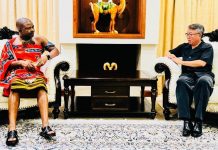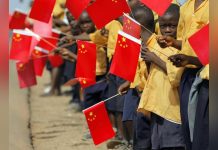Africa-Press – Eswatini. The 15 entrepreneurs were among 80 other women who have just completed a 3-month training course designed by UNESCO and its new Category 2 Institute, Ai Movement, and funded by the Morocco’s OCP Foundation. The training consisted of a three-month long online training, followed by an intensive 2-week Summer Camp held in July 2024 at the Ai Movement Artificial Intelligence Centre in Rabat. The women were selected from 28 African countries across the five regions of Africa.
The training aimed not only to nurture the entrepreneurs’ start-ups and build their skills, but also to create a continent-wide network of women in AI to facilitate continuous dialogue and exchange. All the start-ups harness AI and tech to provide sustainable development solutions, in line with the SDGs and the African Union’s Agenda 2063.
The women selected to win grants of between 10,000 and 30,000 Euros are:
1.Jihane Ouhejjou from Morocco: MAEIA – AI Powered Water Loss Management
MAEIA addresses the critical issue of water loss in pipelines by leveraging AI and IoT technologies, answering the SDG 6 targets. It’s a digital twin of water systems to detect and predict leaks, optimizing water management. Sensors gather real-time data, and AI models analyze it to provide real-time insights and preventive measures, significantly reducing water waste and operational costs.
2. Nguse Geofrey Ngulumbi Tanzania: TokomezaPPR – Eliminate PPR, Save Livestock
PPR has 100% morbidity and 90% mortality when detected late, causing €92 million loss annually in Tanzania. Tokomeza PPR uses AI to predict PPR and perform surveillance, aiding focused intervention planning and implementation. This solution boosts livestock production, contributing to SDGs 1, 2, 3, and Agenda 2063 for food security.
3. Ramatou Konate Burkina Faso: Solar Cell for Onion Bulb Preservation
Despite being the fourth largest producer and second largest exporter of onions in West Africa, Burkina Faso faces losses of up to 40% in onion preservation. To address this issue, a solar cell combined with artificial intelligence is being used to optimize onion preservation. Made from eco-friendly materials, this solution enables efficient onion preservation while respecting the environment and contributing to strengthening food security in line with Sustainable Development Goal 12.
4. Godiana Hagile Philipo Tanzania: AnT Smart Energy Tech Solutions: Energy Usage Monitoring & Management: A Smarter Approach
The project addresses the problem of unreliable energy supply, rising energy costs, and inefficiencies that contribute to climate change. The solution is an AI-driven energy management platform designed to optimize energy use. This all-in-one platform incorporates real-time energy monitoring, personalized user insights, and optimization recommendations. The foreseen impacts include reduced energy costs, improved power consumption efficiency, and lowered CO2 emissions by incorporating renewable energy sources.
5. Cesilia Mambile Tanzania: FirePredict – Save Lives and Protect the Environment
The project addresses the problem of forest fires, which cause significant environmental and economic damage in Africa, and existing prediction methods are costly and ineffective. The solution is FirePredict, which uses deep learning models to process satellite images, weather data, and human activity data to predict whether forest fires will happen, where, and when. Real-time alerts and recommendations are delivered via a mobile app, allowing users to take preventive actions. The foreseen impacts include saving lives and protecting the environment.
6. Michele Mukeshimana Burundi: AI-Based Monitoring and Early Warning System for Floods and Landslides in Imbo Plains
The Imbo Plains are located in a region with a tropical monsoon climate and the African Rift Valley. It often records heavy rainfall, causing significant problems such as humanitarian crises. Due to the lack of an alert system and data management, losses are increasing over time. Our system will collect related data to train models using machine learning algorithms, which will help assess the risk, prepare early responses, reduce damage, and provide guidance in decision-making. In perspective, the system will provide payable services according to the needs of clients: government, researchers, insurance companies, and industries.
7. Hanane Yaagoubi Morocco: 3D Building Morocco – Integrated AI in 3D Concrete Printing for Eco-Innovative Construction
In Morocco, high construction costs and environmental concerns challenge sustainable housing development. Our startup integrates AI with 3D concrete printing to construct eco-innovative houses and infrastructure efficiently. This approach reduces costs, minimizes waste, and accelerates construction, fostering sustainable urban growth and reducing environmental impact.
8. Aminata Dembele Mali: Massa Mousso Queens of Technologies – Empowering Malian Women through AI
Malian women face barriers to technology, limiting opportunities and involvement. Massa Mousso empowers Malian women aged 18 to 45 by providing training in digital content creation and AI. This project bridges the digital divide, enhances economic opportunities, and fosters greater participation in decision-making, driving social and economic development in Mali.
9. Nighe Annie Gwaza Malawi: Smart Fertilizer Sensor – Empowering Agriculture through Advanced Sensor Technology
This project addresses inefficient fertilizer application in agriculture. By implementing sensored applicators and using machine learning and AI, the project will use real-time data to optimize nutrient delivery, reducing waste and enhancing crop yield. Practically, farmers will receive precise recommendations through a mobile app and feature phone. This innovation is expected to boost productivity, lower costs, and promote sustainable farming practices.
10. Apiwe Hotele South Africa: Enlighten – Providing AI-Powered EdTech Solutions
We provide a learning platform that harnesses AI to provide online sessions, track student progress, and provide diagnostics for learners and teachers with a goal of closing the STEM skills gap in Africa. We have assisted 300 students and launched a digital hub to ensure access to devices and connectivity.
11. Claire Babirye from Uganda: Deep Learning Indaba – Inferring Crop Pests and Diseases from Soil Image Data
Agriculture constitutes 24% of Uganda’s GDP, employing 64% of the workforce and over 80% of the rural population. Pests and diseases reduce yields. Our approach uses soil sampling, imaging, and machine learning for early threat detection, boosting yields, improving food security, and reducing costs, aligning with SDGs 1 and 2.
12. Consolata Mwirichia from Kenya: Innovate AI Health Lab – Enhancing HIV Testing and Awareness
BESHTE is a virtual counselor for enhancing HIV testing, status awareness, and status disclosure among adolescents and young women in Kenya. Changing risky sexual behavior that may lead to HIV infections and early pregnancies amongst the youth requires interventions that go beyond traditional approaches. We present a customized multilingual AI-based chatbot to interact and disseminate verified sexual reproductive health information anonymously and confidentially to over 20 million Kenyan youth.
13. Jacqueline OKEYO from Kenya: WIKA – Creating Awareness around Sexual Violence and Preventing It
Sexual crimes hinder women’s progress. Our app leverages AI and technology to anonymously report these crimes while serving as a resource hub for police, lawyers, therapists, and medics, fostering a safer and supportive community for victims. It guides victims on reporting sexual crimes and submitting evidence using proper protocols to seek justice.
14. Thokozile Manaka from Lesotho: MultiVA – Reimagining Public Health in Africa
A significant challenge to achieving the 3rd Sustainable Development Goal is the lack of reliable cause-of-death data, particularly in lower- and middle-income countries. To address this, the World Health Organization (WHO) endorsed a tool called Verbal Autopsy. Challenges in automating cause-of-death determination from Verbal Autopsy reports include linguistic differences across cultures, limited training data, and lack of standardization in VA data collection and reporting. Our solution is a framework that incorporates large language models pretrained across multiple domains to enhance cause-of-death classification accuracy. This will lead to improved public health interventions that support evidence-based policies and programs aimed at addressing health challenges.
15. Faith Obafemi from Nigeria: Fezzant – Making Cybersecurity Accessible and Inclusive with AI
At least one in six people experiences permanent, temporary, or situational disability. This means likely exclusion from cybersecurity protection and exposure to cyber risks and attacks. Fezzant is developing an accessibility scanner that identifies accessibility issues in the cybersecurity industry and leverages artificial intelligence for remediation.
These projects demonstrate remarkable diversity and innovation, each addressing critical issues in their regions. The fields explored range from water management to precision agriculture, eco-innovative construction, and public health.
The “African Women in Tech & AI” initiative provides an essential platform for these women to develop their skills and realize their projects. By supporting these projects, the program aims to catalyze positive and sustainable change in Africa. The collaboration between various institutions and the emphasis on AI as a development tool highlight the region’s commitment to integrating women into cutting-edge technology sectors.
For More News And Analysis About Eswatini Follow Africa-Press







